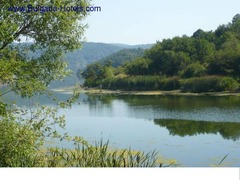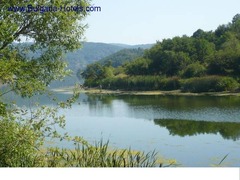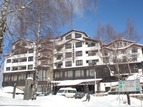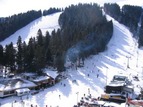New gold treasure in Sakar
Anita Valentinova, source:expert.bg, 23.10.2008

New gold treasure is discovered in Sakar, announced from the National Archaeological Museum.
A mound in the area of the village Izvorovo, Harmanli Municipality, was examined from June until October during regular archaeological excavations, made by a team under the guidance of Doctor Borislav Borislavov and Mrs.Ivanova. The excavations were financed by the Ministry of Culture owing to the help of the National Historical Museum.
Dimensions of the mound are 31m width and height 2,9m.
Due to the whole examination, two stages of heaping are revealed. The first one was in the beginning of II B.C. (Middle Bronze Age) and the second was during Roman period.
A ground of gravel and clay, on which tomb installation was constructed, was established during Bronze Age. This tomb was a mound of quartz stones with a base of clay. A funeral was made in the equipment; all remnants have been carried into richly ornate clay dish and then scattered between the stones.
 Findings which are extraordinarily impressive for that age such as golden ornament, consists of 320 beads, two gold objects in the shape of cervical vertebrae, gold and silver tablet, silver ring and bronze knife are found at the same level. Golden findings similar to these are only found on the island of Crete.
Mr.Borislavov assumes that the grave belonged to a person with a high social status. The quantity and the master jeweler workmanship of objects are probably a result of the fact that a main trade road, which connected Asia, Balkans and Central Europe, passed through this region.
Sakar is a place of a strange stone culture, this of dolmens.
Funeral mound preserves its meaning as a religious place when a village arose during II century A.C. around it.
The finding is unique not only for Bulgaria, because it will help to clarify one of the most unknown periods in the history of Bulgarian land and Europe.
Findings which are extraordinarily impressive for that age such as golden ornament, consists of 320 beads, two gold objects in the shape of cervical vertebrae, gold and silver tablet, silver ring and bronze knife are found at the same level. Golden findings similar to these are only found on the island of Crete.
Mr.Borislavov assumes that the grave belonged to a person with a high social status. The quantity and the master jeweler workmanship of objects are probably a result of the fact that a main trade road, which connected Asia, Balkans and Central Europe, passed through this region.
Sakar is a place of a strange stone culture, this of dolmens.
Funeral mound preserves its meaning as a religious place when a village arose during II century A.C. around it.
The finding is unique not only for Bulgaria, because it will help to clarify one of the most unknown periods in the history of Bulgarian land and Europe.
See source here  Findings which are extraordinarily impressive for that age such as golden ornament, consists of 320 beads, two gold objects in the shape of cervical vertebrae, gold and silver tablet, silver ring and bronze knife are found at the same level. Golden findings similar to these are only found on the island of Crete.
Mr.Borislavov assumes that the grave belonged to a person with a high social status. The quantity and the master jeweler workmanship of objects are probably a result of the fact that a main trade road, which connected Asia, Balkans and Central Europe, passed through this region.
Sakar is a place of a strange stone culture, this of dolmens.
Funeral mound preserves its meaning as a religious place when a village arose during II century A.C. around it.
The finding is unique not only for Bulgaria, because it will help to clarify one of the most unknown periods in the history of Bulgarian land and Europe.
Findings which are extraordinarily impressive for that age such as golden ornament, consists of 320 beads, two gold objects in the shape of cervical vertebrae, gold and silver tablet, silver ring and bronze knife are found at the same level. Golden findings similar to these are only found on the island of Crete.
Mr.Borislavov assumes that the grave belonged to a person with a high social status. The quantity and the master jeweler workmanship of objects are probably a result of the fact that a main trade road, which connected Asia, Balkans and Central Europe, passed through this region.
Sakar is a place of a strange stone culture, this of dolmens.
Funeral mound preserves its meaning as a religious place when a village arose during II century A.C. around it.
The finding is unique not only for Bulgaria, because it will help to clarify one of the most unknown periods in the history of Bulgarian land and Europe.
 Member of:
Member of:



























 Touroperator
Touroperator
